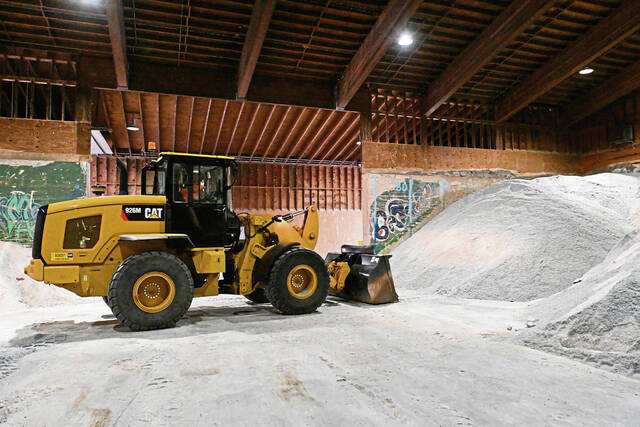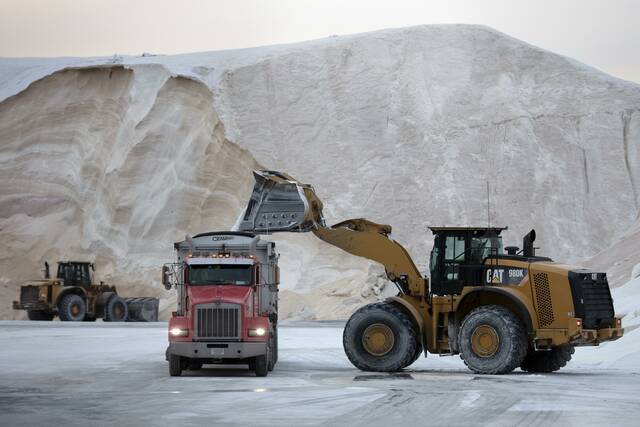Western Pa. public works crews make sure to have sufficient salt on hand each winter
Whether it’s 300 miles of roads in Hempfield or just one square mile in Export, the responsibility for public works crews in winter is the same — keep the roads safe and passable in bad weather.
That also means finding a place to store thousands of tons of salt, especially if the winter weather is as tame as it has been this year.
“We order about 10,000 tons per year, one of the largest orders in Pennsylvania,” said Hempfield Public Works Director Doug Cisco. “Our minimum order is 6,000 tons.”
Many of the boroughs and towns in Western Pennsylvania order road salt through COSTARS, the state’s cooperative purchasing program. It allows members to leverage contracts established by the Pennsylvania Department of General Services to get the best price on a ton of salt.
That is where the “minimum order” comes into play, and it’s also one of the challenges public works directors face when planning for the coming winter.
“You have to be the weatherman, but for next year,” joked Export Council President Barry Delissio. “You sign up in March for the following year.”
This year, Export ordered 135 tons of road salt.
But that estimate also comes with potential penalties under COSTARS. A buyer must purchase at least 60% of their estimate; alternately, if they need more than 120% of that estimate, they must buy the extra at a higher price.
“They’ll give you a plus-minus range where they’ll hold the price,” said Murrysville Public Works Director Bill Paiano, whose department handles a little more than 150 miles of roads.
This year, Murrysville and other towns in its geographic area, such as like Allegheny Township, are paying $79.34 per ton for road salt. Paiano said that figure is up about $12 over last year.
“It’ll fluctuate,” he said. “One year, it’ll go up. Another year, it’ll drop drastically, and sometimes it just stays flat for several years in a row. A lot of it depends on the vendor and where he’s hauling it from.”
Other towns band together to increase their purchasing power. Harrison and Monroeville purchase salt through the nonprofit South Hills Area Council of Governments, made up of 22 local governments that serve more than 316,000 Western Pennsylvania residents.
Monroeville’s salt dome can hold 6,500 tons for salting 111 miles of municipal roads, along with another 10 miles or so of county-owned roads, manager Tim Little said.
“We also have a brine machine that we got through a grant in 2010,” Little said. “We used to sell it to North Versailles and Murrysville because we could do it for 18 cents a gallon, cheaper than you could get it anyplace else.”
In Harrison, public works Superintendent Randy Martinka has kept an annual record of salt usage during all of his 18 years there.
“I keep an average of what we’ve used, which is always just under 2,000 tons,” Martinka said. “I think there’s only been one or two years we haven’t hit that sweet spot.”
Several directors mentioned that this winter in particular has been light on the snow front, which can leave public works departments with a lot of salt. Snowfall since October is 14.3 inches, the third-smallest amount through January in the past decade.
“The thing that’s really worked for us is that, if we don’t use all the salt we have on order, there’s been times the public works folks at Murrysville can take it,” Delissio said.
When Allegheny Township made its estimate last spring, it contracted for 2,000 tons of salt, township manager Greg Primm said.
“At this point, we’re at 900 tons so far this year, and we’re fully stocked,” he said. “We’re still on the hook to buy another 300 to make our minimum.”
In his 15 years with the township, however, Primm said officials have only run into a storage issue once.
“We may have an issue this year, at the rate things are going,” Paiano said. “We’re doing really great on consumption, but I still have to find a home for the 2,700 tons of salt we commit to. But we have plenty on hand, and the weather’s cooperating.”
Patrick Varine is a TribLive reporter covering Delmont, Export and Murrysville. He is a Western Pennsylvania native and joined the Trib in 2010 after working as a reporter and editor with the former Dover Post Co. in Delaware. He can be reached at pvarine@triblive.com.
Remove the ads from your TribLIVE reading experience but still support the journalists who create the content with TribLIVE Ad-Free.



